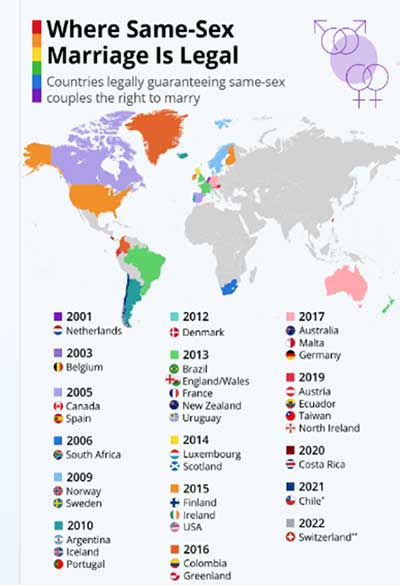Date : 01/06/2023
Relevance: GS Paper 2:Judiciary- Justice
Keywords: Same sex marriage, Urban elite, Human Right, LGBTQ
Context -
- The Supreme Court of India began hearing petitions seeking the legalisation of same-sex marriage on April 18, 2023.
- The question arises whether same-sex marriage is an "urban elitist concept" or an integral right comparable to other constitutional rights.
The Government's Argument against Same-Sex Marriage:
- The Indian government argues that same-sex marriage is not aligned with Indian traditions, culture, or the societal understanding of marriage.
- It contends that the responsibility of recognizing or creating a new social institution like same-sex marriage lies with the elected representatives in Parliament, rather than the judiciary.
- The government highlights the importance of Parliament's role in shaping legislation related to marriage, which encompasses various aspects such as age of consent, prohibited degrees of marriage, judicial separation, and divorce.
Proponents' Argument for Same-Sex Marriage:
- The government's refusal to acknowledge it violates the Constitutional right to equality and the privileges enjoyed by married heterosexual couples.
- They emphasize that marriage is a fundamental right implied in Articles 14, 15, 16, 19, and 21 of the Indian Constitution.
- They assert that recognizing same-sex marriages would align with the principles of transformative constitutionalism and expand the rights of LGBTQ+ individuals.
- They stress that same-sex marriage is not limited to urban elites but also has significance for individuals in small towns and rural areas.
Supreme Court's Response:
- The Supreme Court reserved its decision on petitions seeking the right to same-sex marriage under the Special Marriage Act of 1954.
- The court rejected the notion that same-sex marriages are an urban elitist concept, emphasizing that the Constitution guides their decision-making, rather than popular or sectional morality.
- Acknowledged the complexity of the issue and suggested potential avenues for addressing it, such as administrative modifications, changes to subordinate legislation, or substantial legislative amendments to gender-neutralize the Special Marriage Act.
Global scenario:
Arguments against Same-Sex Marriage:
- Marriage is traditionally understood as the union between a man and a woman, and altering this definition would defy natural law and undermine the institution of marriage.
- Civil unions can provide legal protection for same-sex couples without altering the definition of marriage.
- Equal rights have limits, and allowing same-sex marriage would open the door to other forms of marriage, such as polygamy or marriages between relatives.
- Concerns are raised about the impact of same-sex parenting on children's development and the potential disruption of societal norms.
Arguments for Same-Sex Marriage:
- Denying same-sex couples the right to marry goes against the principles of equal rights and constitutes discrimination.
- Article 21 of the Indian Constitution, which includes the right to marry as part of the right to life.
- Marriage is a personal choice that allows individuals to express themselves, form a family, and enjoy various other freedoms.
- Denying same-sex marriage violates the right to life and personal freedom, and it denies LGBTQ+ individuals the legal protections and benefits associated with marriage.
Conclusion:
The debate surrounding same-sex marriage in India revolves around the conflicting views of equality and tradition. Proponents argue for the recognition of same-sex marriage as a fundamental right, rooted in the principles of equality and personal freedom. Opponents emphasize the importance of upholding traditional norms and argue for alternative legal arrangements, such as civil unions. The Supreme Court's decision on the matter and subsequent legislative action will determine the future of same-sex marriage in India.
Probable Questions for Mains Examination:
- Question1: Discuss the arguments presented by the Indian government against the legalization of same-sex marriage in India. Do you agree with their viewpoint? Substantiate your answer. (10 Marks)
- Question2: Critically evaluate the arguments presented by proponents of same-sex marriage, emphasizing the Constitutional right to equality and its implications for LGBTQ+ individuals. Do you think denying same-sex couples the right to marry constitutes discrimination? (15 Marks)
Source: The Indian Express







